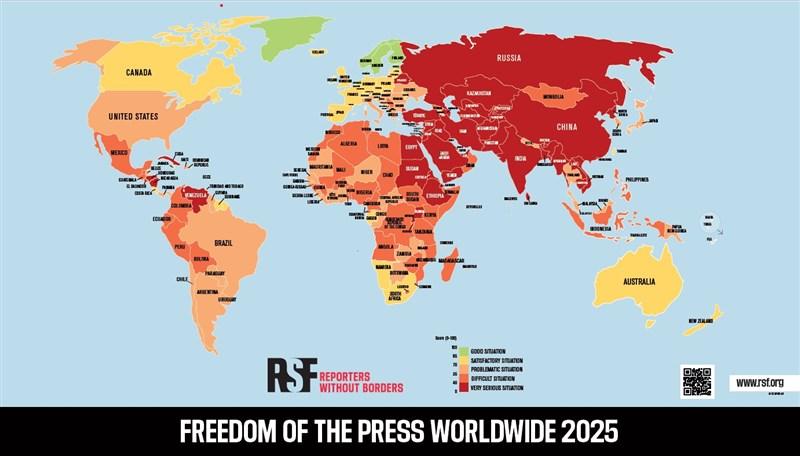Taiwan ranked 24th in the 2025 World Press Freedom Index released by Reporters Without Borders (RSF) today, climbing three places from the previous year at a time when press freedom declined in most countries.
The latest rankings saw Taiwan moving up three spots to 24th out of the 180 countries and regions reviewed by RSF, placing second in the Asia-Pacific and first in East Asia.
Speaking with CNA, Aleksandra Bielakowska, advocacy manager at RSF's Asia-Pacific Bureau, said Taiwan's improvement was largely due to declines in other countries, as the country's global score, which stood at 77.04, remained nearly stagnant.

Photo: Reporters Without Borders
Bielakowska, who also serves as chairperson of RSF's Taipei chapter, said it was "quite significant" how public trust in the media had grown in Taiwan over the past five years, according to the Digital News Report by the Reuters Institute, from 24 percent in 2020 to 33 percent last year.
However, she took note of "government pressure" that had led the English-language public broadcaster TaiwanPlus to remove a report referring to then-US presidential candidate Donald Trump as a "convicted felon" last November.
The instance was "rare" but "deplorable and very worrying," Bielakowska said, adding that public media had a mandate to serve the public and must be able to operate independently from the government.
At the time, the Public Television Service (PTS), to which TaiwanPlus is affiliated, cited concerns over "[the report's] objectivity" as the main reason for the removal.
Culture Minister Li Yuan (李遠) later publicly said the controversy caused by the report was "very serious" and that his ministry had "informed" PTS of its seriousness.
Bielakowska also expressed concern over the press freedom situation in Hong Kong, which dropped from 135th to 140th in the rankings and recorded its lowest global score of 39.86 this year.
"Basically, we see that it's starting to be almost impossible [for Hong Kong journalists] to continue working" in an environment where they face ongoing government pressure and, in some cases, sedition charges for their reporting, she said.
The latest rankings showed that press freedom worldwide deteriorated over the past year to the "difficult" category — the second-lowest in the five-tier system — for the first time since the index was launched in 2002.
"More than six out of 10 countries, or 112 in total, saw their overall scores decline in the index," the Paris-headquartered journalist group said, attributing the deterioration to economic pressure sustained by media outlets.
The situation largely stemmed from ownership concentration, pressure from advertisers and financial backers, and limited or nontransparent public funding, RSF said.
Norway again topped the rankings this year, followed by Estonia and the Netherlands, according to the index based on surveys with journalists, researchers and human rights activists worldwide.
At the other end of the list are China (178th), North Korea (179th), as well as Eritrea (180th) in the Horn of Africa.

Taiwanese can file complaints with the Tourism Administration to report travel agencies if their activities caused termination of a person’s citizenship, Mainland Affairs Council Minister Chiu Chui-cheng (邱垂正) said yesterday, after a podcaster highlighted a case in which a person’s citizenship was canceled for receiving a single-use Chinese passport to enter Russia. The council is aware of incidents in which people who signed up through Chinese travel agencies for tours of Russia were told they could obtain Russian visas and fast-track border clearance, Chiu told reporters on the sidelines of an event in Taipei. However, the travel agencies actually applied

New measures aimed at making Taiwan more attractive to foreign professionals came into effect this month, the National Development Council said yesterday. Among the changes, international students at Taiwanese universities would be able to work in Taiwan without a work permit in the two years after they graduate, explainer materials provided by the council said. In addition, foreign nationals who graduated from one of the world’s top 200 universities within the past five years can also apply for a two-year open work permit. Previously, those graduates would have needed to apply for a work permit using point-based criteria or have a Taiwanese company

The Shilin District Prosecutors’ Office yesterday indicted two Taiwanese and issued a wanted notice for Pete Liu (劉作虎), founder of Shenzhen-based smartphone manufacturer OnePlus Technology Co (萬普拉斯科技), for allegedly contravening the Act Governing Relations Between the People of the Taiwan Area and the Mainland Area (臺灣地區與大陸地區人民關係條例) by poaching 70 engineers in Taiwan. Liu allegedly traveled to Taiwan at the end of 2014 and met with a Taiwanese man surnamed Lin (林) to discuss establishing a mobile software research and development (R&D) team in Taiwan, prosecutors said. Without approval from the government, Lin, following Liu’s instructions, recruited more than 70 software

Chinese spouse and influencer Guan Guan’s (關關) residency permit has been revoked for repeatedly posting pro-China videos that threaten national security, the National Immigration Agency confirmed today. Guan Guan has said many controversial statements in her videos posted to Douyin (抖音), including “the red flag will soon be painted all over Taiwan” and “Taiwan is an inseparable part of China,” and expressing hope for expedited reunification. The agency last year received multiple reports alleging that Guan Guan had advocated for armed reunification. After verifying the reports, the agency last month issued a notice requiring her to appear and explain her actions. Guan